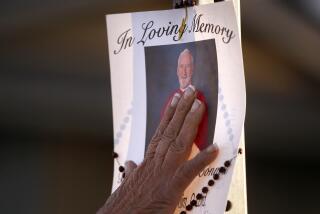Bishop Tells of Serving as Kevorkian Jury Foreman
- Share via
Bishop Donald Ott is accustomed to leading Michigan’s United Methodists, but for the last few weeks, he had a different job: foreman of the jury that acquitted Dr. Jack Kevorkian in Pontiac of illegally aiding suicides.
Ott, who had written about his support of doctor-assisted suicide after losing his father to liver cancer, said he thinks the jury’s March 8 decision is a sign of a “societal shift of some major proportions.”
“I’m hopeful that my involvement as a bishop, as surprising as it is to everyone, including myself, will have the positive effect within the United Methodist Church--and perhaps a wider community--of looking at the issues that are involved in assisted death,” he said in an interview Tuesday.
Ott, 56, and the other members of the jury determined that Kevorkian did not violate a now-expired Michigan law banning assisted suicides. The retired pathologist had been accused of aiding the suicides of two terminally ill patients by helping them inhale carbon monoxide through a mask.
Ott said he was quizzed by the judge and prosecution and defense attorneys about his views on assisted suicide, although they did not ask him if he had written about the issue.
The bishop expressed his personal beliefs in a 1993 column in the Michigan Christian Advocate, a United Methodist newspaper, marking the first anniversary of his father’s death.
“Choosing the time of one’s death in a terminal condition can be an expression of faithful living,” he wrote.
Under questioning from the judge and lawyers during jury selection, Ott reiterated some of his views.
“I told them that I believed that an individual should have the right to choose in a terminal situation their death with spiritual and medical counsel,” Ott said.
He was surprised that he was retained on the panel, but attributes the decision to his explanation to the court that he could set his views aside.
“I indicated that in my responsibility as a bishop of the church I was called on to interpret and apply the law of the church and did so at times in contradiction to my own personal beliefs,” he said.
Ott called the case both “fascinating” and “grueling.” He said the jury deliberations--which lasted about nine hours over two days--were particularly difficult.
“I compared it to a PhD course in group dynamics compressed into one day,” he said.
Although the jurors had varied opinions about assisted suicide, in the end they focused on the wording of the law.
“It was helpful to me and to a few other jurors to make a distinction between primary and secondary intentions and motives,” he said. “To have a primary motive of an intent to relieve pain and suffering removed the possibility of having a primary intention to cause death.”
Ott recalled thanking hospice workers at his father’s memorial service for assisting his family.
He said he wished the hospice staff could have taken his father’s experience of dying “one step further--to meet his wish and ours that days or a few weeks might have been shortened by a measure that would have allowed his release from life.”
Asked if he thought assisted suicide may someday become an accepted practice, Ott replied, “I hope so.”
More to Read
Sign up for Essential California
The most important California stories and recommendations in your inbox every morning.
You may occasionally receive promotional content from the Los Angeles Times.













